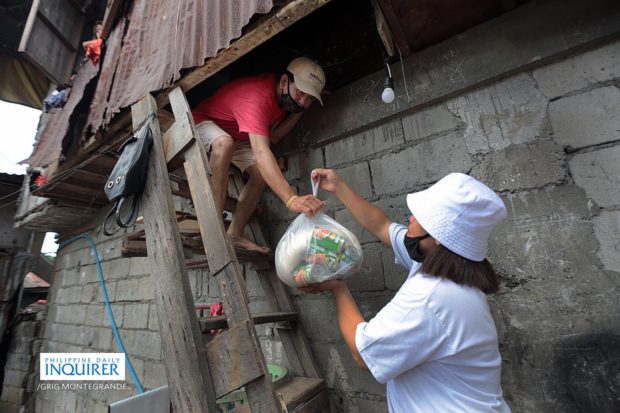
LOOK: Informal settlers of Sitio San Roque receive relief goods, consisting of 5 kilos of rice and 13 pieces of assorted canned goods, from the City Government of Quezon City on Thursday, April 2, 2020, a day after police authorities arrested protesting settlers demanding food and government aid amidst the Luzon wide enhanced community quarantine (ECQ).-INQUIRER/GRIG C. MONTEGRANDE
MANILA, Philippines — Malacañang is saddened by the reported increase in the number of Filipinos who experience hunger amid the coronavirus disease 2019 (COVID-19) crisis.
“Talagang nakakalungkot iyan kaya nga po lahat po ay ginagawa natin para magbigay ng ayuda sa ating mga mamaya,” presidential spokesman Harry Roque said Friday in an interview on GMA’s Unang Hirit.
(That is really saddening, that is why we are doing all we can to extend assistance to our countrymen.)
“Nais sana nating maiwasan iyong ganyang malungkot na balita, pero talaga pong kapag sarado ang ekonomiya ay marami talagang nahihirapan at naiintindihan po iyan ng ating Pangulo. Kaya nga po sana magtulungan na tayong lahat para po lalo pa nating mabuksan ang ating ekonomiya,” he added.
(We wish we could avoid such sad news. But when the economy is closed, many will face difficulties and our President understands that. So let’s all work together to further open our economy.)
A Social Weather Stations (SWS) survey earlier revealed that 16.7 percent of the respondents or 3.9 million families — surveyed virtually from May 4 to 10 — experienced involuntary hunger in the past three months, a huge spike compared to the 8.8 percent involuntary hunger rates recorded last December 2019.
This is also the highest hunger rate registered under President Rodrigo Duterte’s term and highest since the 22.0 percent recorded in September 2014.
For the past three months, hunger rates in Metro Manila were at an alarming 20.8 percent, from just 9.3 percent in December 2019.
This means that one of five Metro Manila residents or an estimated 693,000 families experienced involuntary hunger from February to April.
Metro Manila, the country’s economic center, and other COVID-19 high risk areas remain under quarantine, although some restrictions were lifted to to jumpstart the economy.
The government has also set aside about P200 billion for two-month cash subsidy package for 18 million low-income households to help tide them over while the coronavirus lockdown keeps them away from their jobs.
The beneficiaries are set to receive subsidies of P5,000 to P8,000 per household.
The distribution of the first tranche of the aid, however, was marred by delays.
GSG